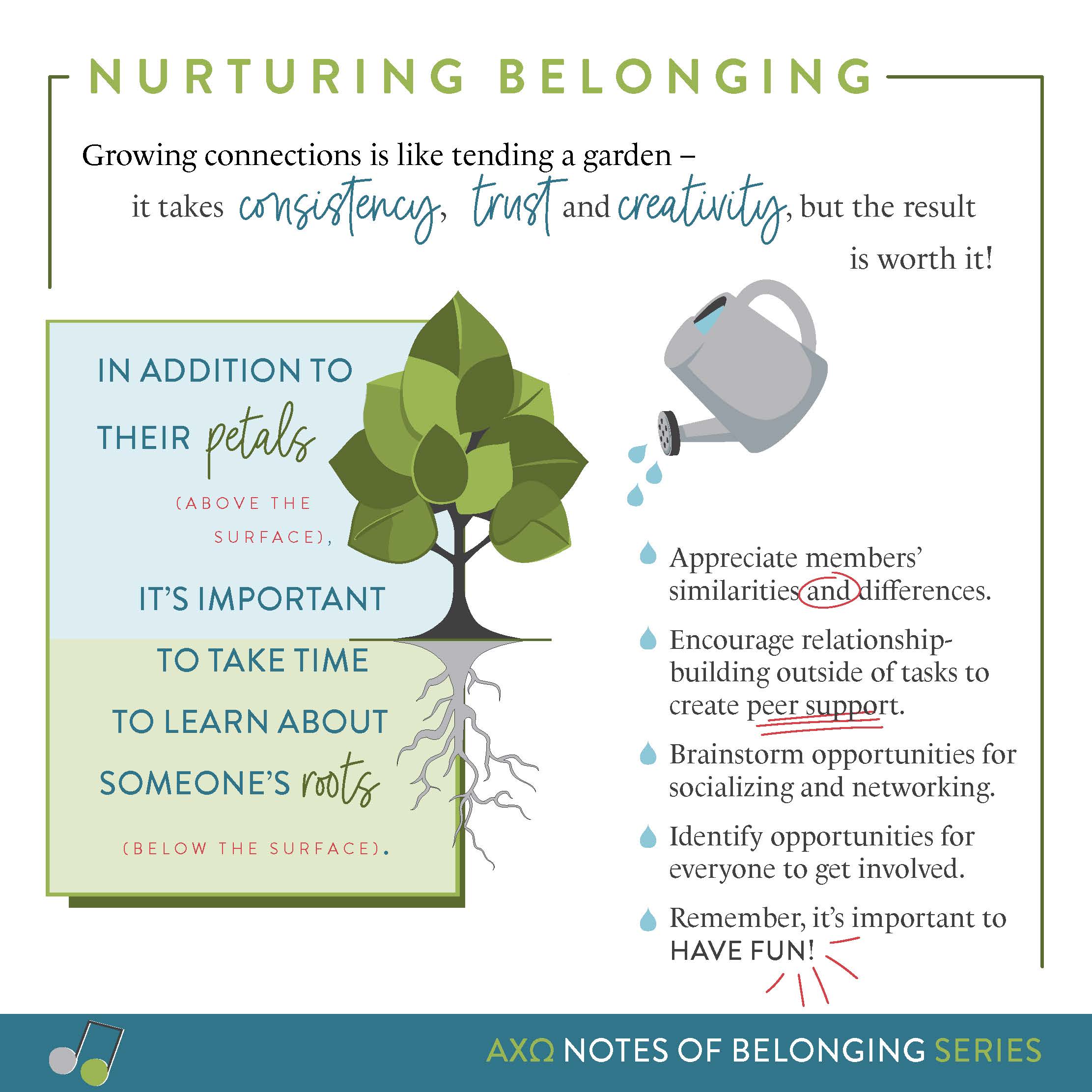BY OCTOBER DAVIS (IOTA CHI, MIDDLE TENNESSEE STATE UNIVERSITY), ASSOCIATE DIRECTOR OF VOLUNTEER AND ALUMNAE ENGAGEMENT
When you onboard new volunteers to your team or bring new members into your chapter, you may have a standard process of welcoming them with some “get to know you” activities. That may look like icebreakers, helping them meet others or facilitating opportunities to make immediate connections. If you follow a similar process, that’s a great place to start and can create a welcoming environment for all who are joining you!
You may be wondering what comes next after the icebreaker is over … How do we continue nurturing belonging for our members after their initial introduction to our teams and chapters? Growing connections is like tending a garden – it takes consistency, trust and creativity, but the result is worth it! The introductory activities aren’t enough to create a lasting sense of belonging. You must develop and facilitate intentional stops along the way for your members to get to know each other better.
As you’re brainstorming creative ways for your team to get to know each other, it’s important to remember there is a difference between someone’s roots (below the surface) and their petals (on the surface). It may take longer for your members to feel comfortable sharing about their roots (e.g., what they are passionate about or who their family and friends are). By creating multiples spaces for sharing, you’re setting your members up to feel more comfortable being vulnerable, creating meaningful relationships and connecting to the work that you’ll do together.
HOW CAN YOU NURTURE BELONGING INSTEAD OF VIEWING IT AS A “ONE AND DONE” EVENT?
Appreciate members’ similarities and differences.
We all bring our unique experiences to Alpha Chi Omega! As you nurture belonging on your team and in your chapter, take time to appreciate all the things that make us similar and different. As members become connected to each other, their desire to learn more about those they are interacting with will grow. Consider adding fun facts to your monthly team email or sharing out updates during your next meeting. You may be surprised to learn how many of your team members were a part of the band in high school or currently volunteer in their local communities. It may seem simple, but people want to learn about the people they spend time with!
Encourage relationship-building outside of tasks to create peer support.
As your team works together to accomplish tasks, there will be natural relationship-building. How can you ensure the communication continues once the tasks are complete? Nurturing belonging not only furthers communication, but it also builds buy-in. Members who feel connected to one another are also more likely to offer peer support and jump in when others need help.
Brainstorm opportunities for socializing and networking.
You’ve all learned each other’s names during your icebreaker, so what comes next? Get your team involved with brainstorming activities that you all can do. Ask for feedback about the types of activities and networking they are interested in and find ways to integrate them throughout the year. Do you know a successful volunteer team or another chapter that is well connected to one another? Reach out and ask what they are doing to strengthen sisterhood in their group.
Identify opportunities for everyone to get involved.
An important piece of belonging is tied to involvement and how members view their contributions to the team. Everyone wants to feel like they are making meaningful contributions! As a leader, it is important to consider how you can involve everyone.
By involving your team, you are not only nurturing a sense of belonging among members, but you are also setting the team up for success in the future. Providing leadership opportunities is instrumental in succession planning. The next chapter leader or volunteer team lead might be the member who hasn’t had an opportunity to get involved yet or may not know the best way to utilize existing skills.
Remember, it’s important to have fun!
Creating a sense of belonging and continuing to nurture that on your team is not meant to be a growing list of to-do items. Create space to have fun, too! Some days may feel challenging, but it is meaningful work that you are accomplishing together. Find opportunities for your team to take a break and enjoy each other!
When you take time to nurture belonging, you may be surprised by the beautiful things that start to grow!

Learn something valuable from this Note of Belonging? Want to share your thoughts or personal experience with belonging through your Alpha Chi Omega experience? Share your story now!






.png?width=1640&height=924&ext=.png)